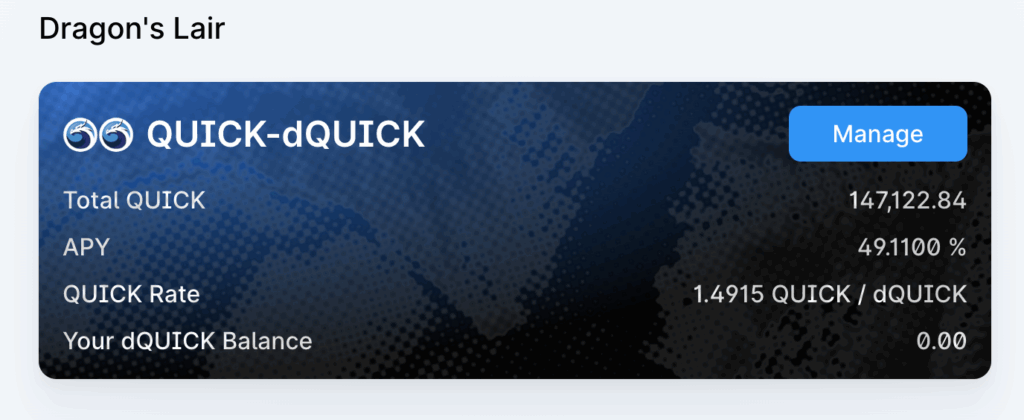How to Use QuickSwap for Low-Fee Trading and Yield Farming
QuickSwap is a Polygon DEX and Automated Market Maker (AMM) copied from UniSwap—letting you trade cryptocurrencies without KYC.

Do you like saving money? If you’re a crypto trader, the answer is probably “yes.” While the competitively low trading fees introduced by DeFi have severely undercut centralized exchanges, high gas fees on networks like Ethereum have made swapping cryptos on decentralized exchanges (DEX) less economically practical.
Not only can users swap cryptos and deploy liquidity pools, QuickSwap also offers built-in liquidity pool token (LP) staking.
That’s why many DeFi platforms have deployed their protocols on layer-2 blockchains: to take advantage of faster transactions and lower gas fees. While most DeFi platforms have diversified across several blockchain networks to give you more options when investing in DeFi, one DEX has taken a different approach. QuickSwap is the biggest DEX on the Polygon sidechain by a wide margin, so exploring the innards of this mythological DeFi protocol is worth your time.
What is QuickSwap?
QuickSwap is an exclusively Polygon-based DEX that uses a modified version of Uniswap’s automated market maker (AMM) formula. The QuickSwap app’s interface feels almost identical to other popular DEXs, but one way the platform differentiates itself is by having built-in yield farming features. Liquidity providers choose QuickSwap not only because it offers several avenues for maximizing yield on a single DeFi platform, but also because of its bustling community.
How to use QuickSwap
QuickSwap is functionally the same as other DEXs, with some extra features incorporated to make the platform a more lucrative yield farming platform. Not only can users swap cryptos and deploy liquidity pools, QuickSwap also offers built-in liquidity pool token (LP) staking. LP token staking enables liquidity providers to generate additional rewards on top of trading fees by further locking their liquidity into the protocol.
QuickSwap DeFi app
Since QuickSwap is a DeFi platform, you’ll need a Web3-enabled browser with a browser extension crypto wallet. You also must hold assets on the Polygon network in order to use QuickSwap, so if your assets are on Ethereum or another blockchain network, you’ll need to bridge them over to Polygon. You can do this by clicking “Bridge” on the top right of QuickSwap app interface. This will take you to cross-network bridge platforms for transferring cryptos across blockchains.
Swap
The default page of the QuickSwap interface is the “Swap” section of the platform. This is where traders can exchange between cryptos. The platform charges a 0.3% fee on most crypto swaps, and this doesn’t include gas fees and price impact (including slippage). QuickSwap V2 introduced a limit order feature that allows traders to swap cryptos at their desired price rather than relegating all swaps to market prices.
Pool
Users can provide liquidity to the QuickSwap DEX through the “Pool” section. Users can contribute to existing pools or deploy their own liquidity pools by depositing an equal dollar amount of two cryptos. Liquidity providers receive LP tokens representing their share of the liquidity pool, and they’re rewarded with fees generated by the pool’s trading activity—usually 0.25%.
Buy
What if you don’t have assets on Polygon and don’t want to bridge your cryptos over from another blockchain? Well, QuickSwap’s fiat onramp partners have you covered. The “Buy” section of QuickSwap enables anyone to buy crypto with their credit card and have it deposited directly into their Polygon wallet. Buying crypto with fiat through QuickSwap is a great hassle-free way to get DeFi-ready cryptos in your wallet without the need for a bridge or centralized exchange like Crypto.com.
QUICK token
QuickSwap uses the QUICK crypto as its native governance token. QUICK can be staked to earn a portion of the fees from trades conducted on the exchange. QUICK stakers automatically receive the dQUICK (Dragon’s Quick) token, which is a liquid staking token representing staked QUICK. QUICK stakers receive a certain number of dQUICK tokens based on the variable conversion rate of QUICK-dQUICK at the time it’s initially staked.
The value of dQUICK relative to QUICK is gradually going up as the platform accrues trading fees. This means that when dQUICK is withdrawn from the staking contract, it gets converted back to QUICK at a conversion rate equaling the original balance plus yield generated from QuickSwap trading fees. In other words, dQUICK holders earn a portion of all QuickSwap trading fees until they convert back to QUICK.
QuickSwap governance
Both QUICK and dQUICK are used for voting on governance proposals to make changes to the QuickSwap protocol. The number of QUICK tokens in a user’s wallet determines how many votes they get, but votes using dQUICK are counted according to the variable QUICK-dQUICK conversion rate at the time of voting. Enabling governance with dQUICK incentivizes long-term active participation of QuickSwap stakeholders in the protocol.
QuickSwap yield farming
Although most yield farming incentives are designed for liquidity providers, you don’t have to deposit your cryptos into a liquidity pool to earn DeFi yield on QuickSwap. Holding LP tokens is a great way to earn passive income on QuickSwap, but investors who aren’t comfortable locking up their cryptos to provide liquidity can simply stake QUICK tokens to earn yield from the platform.
Dragons Lair
QUICK holders can stake their tokens in the Dragon’s Lair to earn yield derived from trading fees. Out of the 0.3% fee taken from all trades, 0.04% is used to market buy QUICK and distribute it to QUICK stakers (AKA dQUICK holders). The QUICK staking yield rate varies based on how much of the total QUICK supply is currently staked, so the accuracy of the advertised APY is questionable. Rewards are claimed by depositing dQUICK back into the Dragon’s Lair in exchange for QUICK tokens based on the QUICK conversion rate.

Dragon’s Syrup
Those who want to stake QUICK but don’t want to earn in-kind rewards can also stake their QUICK tokens in syrup pools. Dragon’s Syrup enables investors to stake QUICK in exchange for small-cap altcoins belonging to emerging crypto projects. Dragon’s Syrup helps new crypto tokens achieve higher liquidity by increasing circulation and letting QuickSwap users lend support to new projects without buying or trading. Unlike Dragon’s Lair, which is virtually indefinite, syrup pool staking is a short-term yield strategy that only works with less reputable tokens.
Yield farming
Quickswap gives liquidity providers more yield farming options than other DEXs since they can stake their LP tokens in either LP mining pools or dual mining pools. First, liquidity providers can get in-kind yield for their LP tokens by staking them in LP mining pools. The more lucrative option is QuickSwap’s “Dual Mining” pools. Staking LP tokens in these pools gets you higher yield denominated in wrapped MATIC (wMATIC) and dQUICK tokens. Dual mining is a great yield farming option for liquidity providers who are bullish on both the Polygon and QuickSwap ecosystems or just want passive MATIC yield to use for future gas fees.
